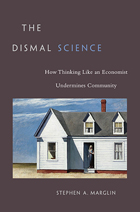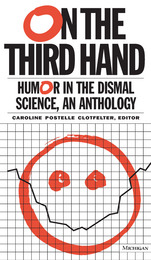
Economists celebrate the market as a device for regulating human interaction without acknowledging that their enthusiasm depends on a set of half-truths: that individuals are autonomous, self-interested, and rational calculators with unlimited wants and that the only community that matters is the nation-state. However, as Stephen A. Marglin argues, market relationships erode community. In the past, for example, when a farm family experienced a setback—say the barn burned down—neighbors pitched in. Now a farmer whose barn burns down turns, not to his neighbors, but to his insurance company. Insurance may be a more efficient way to organize resources than a community barn raising, but the deep social and human ties that are constitutive of community are weakened by the shift from reciprocity to market relations.
Marglin dissects the ways in which the foundational assumptions of economics justify a world in which individuals are isolated from one another and social connections are impoverished as people define themselves in terms of how much they can afford to consume. Over the last four centuries, this economic ideology has become the dominant ideology in much of the world. Marglin presents an account of how this happened and an argument for righting the imbalance in our lives that this ideology has fostered.

Bringing economic humor into the light of day, Caroline Clotfelter gathers her collection of materials into recognizable categories: economists as others see them, the language and methods of economics, Econ 101, micro- and macroeconomics, and basic economic models and ideas. Aiding and abetting her include such luminaries as John Stuart Mill, George Bernard Shaw, Mad Magazine, Stephen Leacock, Emily Dickinson, Rube Goldberg, Pogo, and John Kenneth Galbraith. As no other, this book will challenge economists to enjoy jokes at their own expense; noneconomists may have even less difficulty finding something funny in this most dismal of sciences.
Caroline Postelle Clotfelter, former Professor of Economics, Mercer University, is now retired.
READERS
Browse our collection.
PUBLISHERS
See BiblioVault's publisher services.
STUDENT SERVICES
Files for college accessibility offices.
UChicago Accessibility Resources
home | accessibility | search | about | contact us
BiblioVault ® 2001 - 2024
The University of Chicago Press









